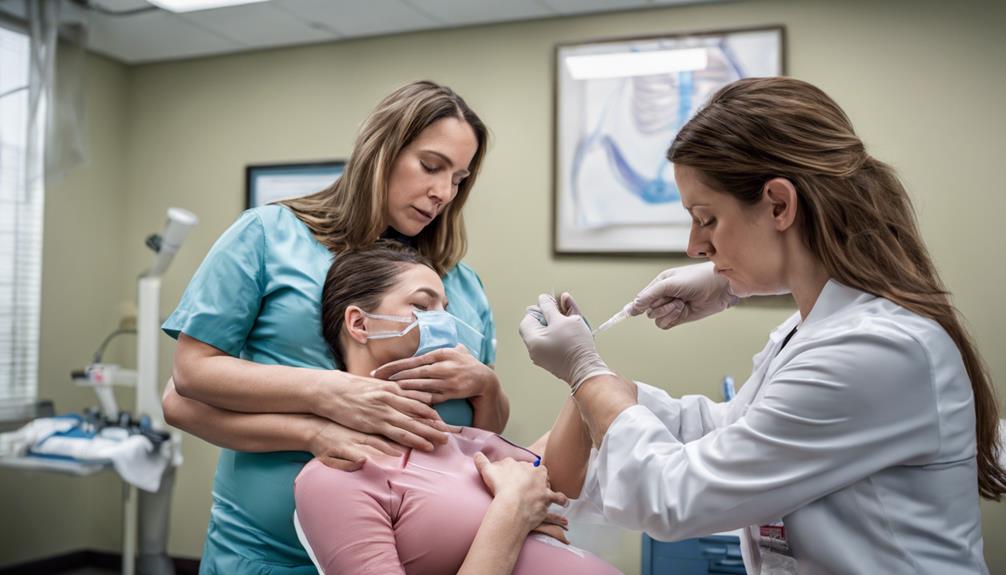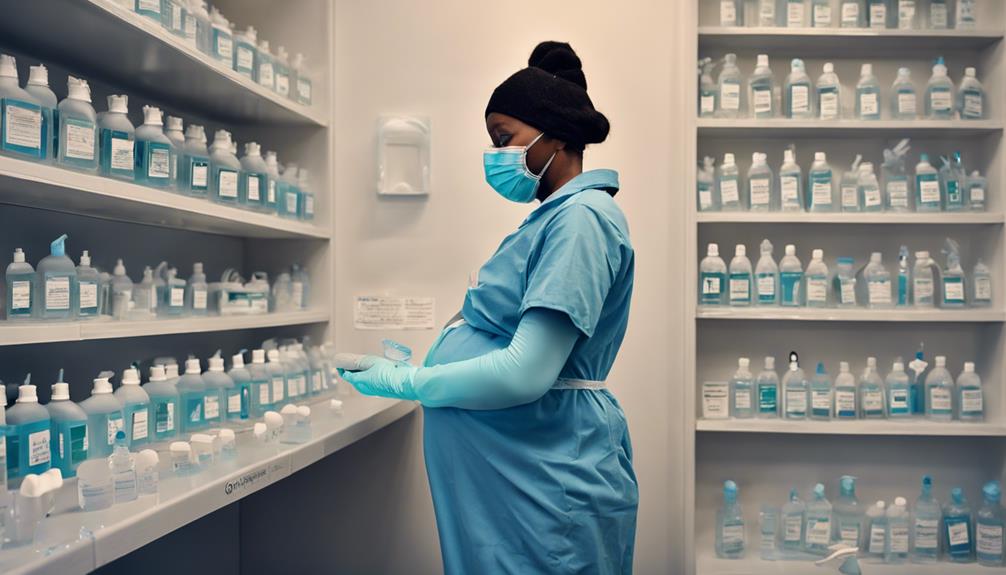During the final stage of pregnancy, taking measures to guard against Respiratory Syncytial Virus (RSV) is crucial to safeguard the health of both the mother and the unborn child. As parents-to-be, it’s essential to proceed through this sensitive time with increased consciousness and attention to detail.
From understanding the symptoms to knowing when to seek medical advice, every step we take plays a pivotal role in safeguarding the well-being of our unborn child. Let's explore together how simple yet effective measures can make a significant difference in our journey towards a healthy delivery.
Key Takeaways
- Monitor for RSV symptoms like coughing and fever.
- Practice strict hand hygiene and disinfect surfaces.
- Seek prompt medical care for worsening symptoms.
- Consult healthcare provider for personalized RSV precautions.
RSV Symptoms to Watch For
When monitoring for RSV symptoms in the third trimester of pregnancy, it's essential to be vigilant for signs such as coughing, sneezing, fever, and wheezing. These symptoms could indicate a potential RSV infection, which poses risks to both maternal and fetal health. Additionally, in the later stages of pregnancy, shortness of breath and difficulty breathing may be severe indicators of RSV that require immediate medical attention. It's vital to recognize these symptoms early on to prevent complications like pneumonia and respiratory failure, especially in the context of pregnancy where the risks are heightened.
If RSV symptoms worsen or if there are underlying conditions like asthma present, seeking prompt medical care becomes even more critical. Complications from RSV can have serious implications for maternal health, reinforcing the importance of closely monitoring for any signs of infection during the third trimester. By staying vigilant and proactive in addressing any concerning symptoms, we can better safeguard both the mother and the baby from the potential risks associated with RSV during pregnancy.
Avoiding Crowded Places

To minimize the risk of RSV exposure during the third trimester of pregnancy, pregnant individuals should actively avoid crowded places. Here are three key ways to help reduce the risk:
- Choose Outdoor Activities: Opting for outdoor activities over indoor crowded places can lower the chances of coming into contact with respiratory viruses like RSV. Parks, gardens, or nature trails provide a safer environment for pregnant individuals in their third trimester.
- Practice Social Distancing: Maintaining distance from individuals in crowded settings is important. By keeping a safe distance and avoiding close contact with people in public spaces, pregnant individuals can decrease the risk of exposure to RSV and other respiratory illnesses.
- Limit Large Gatherings: It's crucial to steer clear of events, malls, or public transportation where crowds are common. Minimizing exposure to crowded areas can significantly reduce the likelihood of contracting RSV during the vulnerable third trimester of pregnancy.
Hand Hygiene Importance
Maintaining proper hand hygiene through regular handwashing and sanitizing is essential in preventing RSV transmission during pregnancy. In the third trimester, when the risk to both the pregnant individual and fetal health is heightened, it becomes paramount to prioritize hand hygiene.
Washing hands with soap and water for at least 20 seconds, especially after being in public spaces or around individuals who may be sick, helps eliminate respiratory syncytial viruses that could pose a threat. Additionally, utilizing hand sanitizers containing at least 60% alcohol can offer a convenient alternative when traditional handwashing facilities aren't accessible.
Remember, avoiding touching the face can further reduce the chances of RSV transmission from contaminated hands. To establish a safe environment, disinfecting commonly touched surfaces like doorknobs and phones with suitable disinfectants plays a critical role in preventing the spread of RSV.
Understanding RSV Transmission

Proper understanding of how respiratory syncytial virus (RSV) spreads through respiratory secretions and contaminated surfaces is essential in preventing its transmission effectively.
When it comes to RSV transmission, here are three key points to keep in mind:
- RSV Spread: RSV is primarily spread through respiratory droplets when an infected person coughs or sneezes. It can also spread by touching contaminated surfaces and then touching the face, especially the eyes, nose, or mouth.
- Isolation Measures: Patients diagnosed with RSV should be isolated to prevent the virus from spreading to others. This precaution is particularly important in healthcare settings where vulnerable individuals, like pregnant individuals in their third trimester, may be present.
- Hand Hygiene and Environmental Cleaning: Strict adherence to hand hygiene practices, such as washing hands frequently with soap and water, and thorough environmental cleaning are essential in reducing the risk of RSV transmission in healthcare facilities and other communal settings. These measures help prevent healthcare workers from acquiring RSV through contact with contaminated surfaces.
Consulting Healthcare Provider
During the third trimester, consulting your healthcare provider is essential for personalized guidance on RSV precautions. Your healthcare provider can discuss the benefits and risks of RSV vaccination during pregnancy, helping you make an informed decision.
They can also provide tailored recommendations on preventive measures such as practicing good hand hygiene and avoiding contact with sick individuals to reduce the risk of RSV exposure. It's important to inquire about the best timing for RSV vaccination and any contraindications specific to your pregnancy stage.
Frequently Asked Questions
Is It Safe to Be Around RSV While Pregnant?
Being around RSV while pregnant poses risks, especially in the third trimester. We should avoid close contact with infected individuals, prioritize hand hygiene, and seek medical advice if exposed. Protecting ourselves and our baby is essential.
Do RSV Antibodies Pass to Fetus?
Yes, RSV antibodies can pass to the fetus, offering vital protection against RSV infection. This natural defense mechanism helps reduce severe complications in newborns, emphasizing the significance of RSV vaccination during pregnancy for enhanced immunity.
Can You Get RSV Vaccine at 37 Weeks Pregnant?
Yes, you can get the RSV vaccine at 37 weeks pregnant, but it may offer reduced effectiveness. For best protection, it's best to get vaccinated between 32 to 36 weeks to guarantee maximum transfer of antibodies to the newborn.
What Should You Avoid During Rsv?
We avoid crowded places and close contact with symptomatic individuals to lower RSV risks. Regular handwashing, avoiding sharing personal items, and cleaning surfaces help prevent exposure. These precautions safeguard against RSV transmission during pregnancy.
Conclusion
In summary, it's essential for pregnant individuals in the third trimester to take precautions against RSV.
One interesting statistic to ponder is that approximately 177,000 children under the age of 5 are hospitalized each year due to RSV infections in the United States alone.
By following preventive measures such as good hand hygiene and avoiding crowded places, pregnant individuals can help protect themselves and their unborn babies from this potentially dangerous virus.










